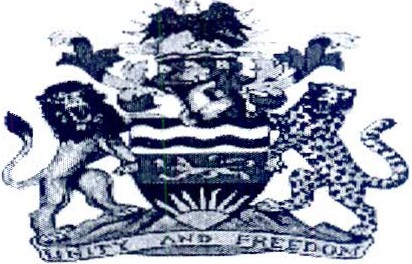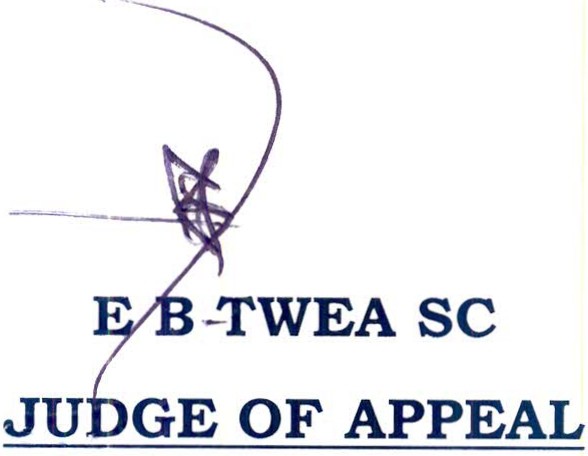

IN THE MALAWI SUPREME COURT OF APPEAL
SITTING AT BLANTYRE
CIVIL APPEAL CAUSE NO. 08 OF 2015
(Being High Court Civil Case No 2195 of 2010)
BETWEEN :

JOSHUA CHISA MBELE.................................................................. APPLICANT
AND
DAVIES LANJESI
MANKHUMBO JAMES MAPUNDA
ZEBUNISA TEMBO.......................................................................... RESPONDENTS
CORAM : HONOURABLE JUSTICE E. B. TWEA, SC JA
MR Ngoma ...................................Counsel for the Appellant
Absent..........................................Counsel for the Respondent
Mr Minikwa ..................................Court Clerk
RULING
This is a Summons to strike out notice of appeal. It is brought under Part 52.9 (1) (a) of Civil Procedure Rules 1998 as read with Section 7(b) of the Supreme Court of Appeal Act. The applicant
contends that this appeal should have been brought before the Court below, in accordance with Rule 3 of the High Court (Exercise of Jurisdiction of Registrar) Rules, and not before this Court. Further, that it was brought under a wrong legal provision, to wit, Order III rule 3 of the Supreme Court of Appeal Rules.
Both parties filed skeleton arguments.
The facts of this case are that by a judgment of the High Court, Commercial Division, dated 31st December, 2015, the respondent was found liable for damages for breach of trust. The damages were to be assessed by the Registrar. The parties appeared before the Assistant Registrar, His Honour Kacheche, for assessment of damages. Several issues arose in the course of assessment, more particularly on the propriety of the claims of breach of trust and account of profits which, according to the Assistant Registrar, should have been claimed in the alternative. Be this as it may, the Assistant Registrar granted damages for breach of trust. He ordered that these be distributed to the appellants, in proportion to their contributions. The appellants were not satisfied with the award of damages and sought to appeal to this Court.
The Notice of Appeal, Exhibit WK1 , exhibited to the affidavit in support of the application was not disputed. It was also not disputed that the date stamp thereon showed that filling fees were paid in the Court below and that it was filed in this Court on the same day. Further, there was no dispute that the Notice of Appeal
was filed pursuant to Order III rule 3 of the Supreme Court of Appeal Rules. It cannot be denied that Order III rule 3 of the Supreme Court of Appeal Act regulates application for leave to appeal, where an appeal lies only with leave. Such leave is obtained ex-parte. It is only after leave is obtained that the intending applicant can file a notice of appeal. It is important to mention however, that Order III rule 3 expressly states that:
"Provided that nothing in this subrule shall be deemed to prohibit the filing of a notice of appeal prior to the hearing of the application for leave to appeal."
Be this as it may, it was not suggested, nor argued, for the appellants that the notice of appeal was filed in anticipation of seeking leave to appeal. However, it was argued for the respondents to this application, that the filing of the appeal in this Court should be considered an irregularity which is curable.
The respondents further argued that assessment of damages before the Registrar is actually a hearing. The Registrar hears witnesses who are subjected to cross-examination and makes a finding of fact on issues. It was argued therefore, on the authority to Louis Chakwantha vs Prime Insurance (HC) Civil Cause 2195 of 2010 and Dziko Nasiyaya vs The Attorney General (MSCA) Civil Appeal 7 of 2012 that the Registrar's decision on assessment of damages is final in respect of the damages, and not interlocutory. Such judgment therefore is appealed to this Court and not to a Judge in Chambers in the Court below. I will refrain
from commenting on pronouncements in the Court below as to what should be the applicable law before this Court. It is preposterous that the Court below would pretend to make decisions that would bind this Court. I, however, find that this proposition is well supported at law. In this respect, therefore, I would gladly welcome the decisions of Mwaungulu J, as he then was, in the cases of Innocent Sukali vs Southern Bottlers Limited and NICO General Insurance (HC) Personal Injury Cause 774 of 2012 and Chakwamba (supra).
The genesis of this interpretation is Order 58 Rule 2 of the Rules of the Supreme Court (RSC) which provide that:
"(2) An appeal shall lie to the Court of Appeal from any judgment, order or decision of a master given or made.
(a) (...)
(b) on assessment of damages or of the value of goods under Order 36 or otherwise, or an assessment of interest;
And where a judgment, order or decision of a kind referred to in paragraph (b) includes or involves a determination of any other matter, an appeal shall lie to the Court of Appeal in relation to such other matter."
This rule and its explanation is clear.
The applicant submitted and argued that, on authority of Hetherwick Mbale vs Hissan Maganga MSCA Civil Cause 21 of
2013, Order 58 of the RSC is no longer applicable. It was argued that it was settled in that case that the RSC have been replaced by the Civil Procedure Rules, 1998. The judgment in that case is clear. The Court, considered the import of section 8 of the Supreme Court of Appeal Act that, where our Act doesn't provide specific procedure, the Court is enjoined, in civil appeals, to follow the practice and procedure observed in the Court of Appeal in England.
The Court, in that case was of the view that since section 8 of the Supreme Court of Appeal Act was not amended, then it is still applicable. I would have no problem with such a conclusion. However, it is important to point out that the Court, in that case, was expressing its opinion on the controversy surrounding the amendment to section 29 of the Courts Act. In his own words the Judge therein said:
"There is a controversy as to which rules of practice apply in this Court. Justices of Appeal do not appear to be in agreement. Some are using the old RSC, 1965. While others have progressed to the CPR post 2000. The amendment to section 29 of the Courts Act in 2004 did not affect S. 8 of the Act. To the extent that S. 8 has remained intact, there ought not to be this controversy where the Act and the Rules made there under have not made provision for any particular point of practice and procedure , it is clear that we are compelled to look to the practice and procedure observed by the Court of Appeal in England. I therefore find that ordinarily, the CPR as opposed to the RSC are current in this Court."
This notwithstanding, it is important to have recourse to section 29 of the Courts Act, as amended. It provides as follows:
"Save as otherwise provided in this Act, the practice and procedure of the High Court shall, so far as this local circumstances admit, be the practice and procedure (including the practice and procedure relating to execution) provided in the Rules of the Supreme Court, 1999".
Provided that-
(a) the Rules of the Supreme Court may at any times be varied , supplemented, revoked or replaced by rules of Court made under this Act,
(b) any of the Rules of the Supreme Court which refer solely to procedure under the Acts of the United Kingdom Parliament other than statutes of general application in force in England on the eleventh day of August, 1902, and any such Acts as have been applied to or are from time to time in force in Malawi shall not have any application in Malawi,
(c) if any provision of the Rules of Supreme Court is inconsistent with any provision of any rules of Court, the latter shall prevail and Rules of the Supreme Court shall, to the extent of such inconsistency, be void."
It may be argued that this section could have been better couched. However, it is clear. It freezes the practice and procedure, in civil causes, in the High Court in the 1999 edition of the RSC ,
1965. It is also clear, from the proviso, paragraphs (a) and (c), that it was anticipated that "at any time" the RSC would be varied, supplemented, revoked or replaced by rules of court made under the Courts Act. Further, that such rules of court would take precedent over RSC. It may be argued that twelve years, after the 2004 amendment, is too long a time to be described as "any time" soon. However, we cannot lose sight of paragraph (b) of the proviso which effectively ousts any procedure under Acts of the United Kingdom Parliament other than statutes of general application made on the eleventh day of August 1902. In my view the intent of our Parliament is clear; the High Court is restricted to apply the practice and procedure in RSC 1999 edition, as would apply in Malawi, and statutes of general application.
It is correct that section 29 of the Courts Act does not refer to section 8 of the Supreme Court of Appeal Act. In this sense therefore the import of Hetherwick Mbale v Hissan Maganga (supra) would be correct. However, the question is, would it have been the intention of Parliament that the High Court and Supreme Court of Appeal should apply different Rules of the Court of Appeal in England: "discarded rules" and "new ones" so to speak? and bring about the current discord and controversy? I would not think so. I take cognizance of the fact that the Court did not consider this issue in the case of Mbale (supra).
If this Court were to accept the freeze of the practice and procedure in High Court and equally applied the practice and
procedure as applies in the High Court of Malawi , there would be no discord or controversy. That, in my view, was the intent of our Parliament. Understandably, the provisions of the CPR 1998, and as revised, are clearer and easy to use, and, I would dare say, have an aura of sophistication and progression and are therefore, attractive.
What should a court user, in the Court below, do where he or she wishes to appeal? In my view, he or she should use the 1999 edition RSC 1965, to which Parliament has restricted the High Court. In the same vein this Court should accept the practice and procedure to which the High Court is restricted. Then there will be no discord. The discord only comes when this Court forces the High Court to have recourse to practice and procedure other than that to which Parliament has restricted it.
I would therefore be very slow to accept the position in Hetherwick Mbale vs Hissan Maganga (supra). I would therefore find that Order 58 Rule 2 of the RSC 1999 edition apply in the Court below. It is the proper procedure for bringing an appeal such as the one in this application. This application, therefore must fail.
I have considered the other issues that were raised in this application. It is not the mandate of a single judge of this Court to dispose of an appeal. However, I would refer the parties to the recent discourse on section 23 of the Supreme Court of Appeal Act, more particularly the import of section 23(1) (a) and (b) , by
Mwaungulu SC, JA in the case of the Attorney General vs Sunrise Pharmaceutical Ltd and Chombe Foods Product Ltd MSCA cause 11 of 2013. I strongly recommend the parties to avail themselves of this judgment before proceeding further in this case.
Costs for this application will be for the respondents.
Pronounced in Chambers this 22nd day of March, 2016 at Blantyre.

1